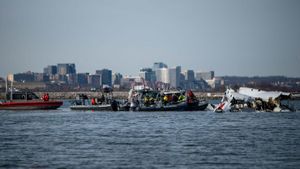The Trump administration’s decision to end temporary humanitarian protections for hundreds of thousands of Venezuelans living in the United States has sparked controversy. According to former President Donald Trump, this move follows a meeting between senior administration official Richard Grenell and Venezuelan President Nicolás Maduro, during which it was reported Venezuela agreed to take back migrants who had entered the U.S. illegally. Trump posted on Truth Social, "Venezuela has agreed to receive, back to their Country, all Venezuelan illegal aliens who were encamped in the U.S., including gang members of Tren de Aragua." The announcement came alongside the release of six U.S. detainees held in Venezuela, suggested by reports from state-run media TeleSUR.
Homeland Security Secretary Kristi Noem defended the decision, stating, "Venezuela no longer continues to meet the conditions for the 2023 designation" of Temporary Protected Status (TPS). This policy previously provided Venezuelan migrants protection against deportation due to the crisis within their homeland, which many human rights organizations argue has worsened under Maduro’s regime. Noem claimed there have been notable improvements across several areas such as the economy, public health, and crime, albeit few share this view.
Critics, including former Venezuelan vice minister of finance David Morán, have vehemently opposed the government's assessment. He expressed disbelief, noting, "This is very hard to understand... Maduro has just executed a coup d’état against the popular will... currently has the largest numbers of political prisoners held since the 25 years of the chavista rule." How can one reconcile the repression and political turmoil Venezuelans face with claims of improved conditions?
The concerns over the deteriorated state of Venezuela are backed by staggering statistics. Over 7.8 million Venezuelans have fled the country, with the most recent estimates indicating around 350,000 could lose their protective status and face deportation back to their war-torn homeland within the next two months. Conditions have dramatically declined, particularly post-Maduro wins re-election amid accusations of electoral fraud, inciting major protests and intensified crackdowns on opposition.
These protests resulted not just from electoral fraud but also from the extreme repression of dissenting voices, with thousands arrested during what had been described as the worst wave of violence and oppression the country had experienced in years. International human rights groups have warned about torture and extrajudicial killings among those taken prisoner, reinforcing the claim made by those like Morán, who said, "today we have more repression, more persecution, more human rights violations."
Following the revocation of TPS, the emotional toll on the community has been severe. José Antonio Colina, president of a Miami-based exile organization, voiced his dismay, stating it is "the opposite" of what is needed. Those deported face grave danger from the regime, with many having to adapt quickly to environments of terror—in environments where anyone deemed as backing the regime's opposition can suffer severe consequences.
Humanitarian organizations are also weighing heavily on the administration's decision. Amnesty International USA remarked on social media, "These are people seeking safety, fleeing a humanitarian crisis and serious political repression." Such perspectives draw attention to the moral and ethical responsibilities of the U.S. as it contemplates significant changes to the ways doomed communities may seek refuge.
The contradiction between the administration’s narrative and the lived reality of Venezuelans exemplifies the tension within current immigration policy. Advocates highlight the need for continued protections for Venezuelans fleeing not just economic disaster but also systematic violence and persecution. The fear of deportation looms large, as many await the consequences of this political decision.
The story is still developing, and as with many political decisions, the fallout can have sweeping ramifications across communities, both for Venezuelans seeking safety and broader discussions on immigration and humanitarian protections going forward.
Making such assessments around complex geopolitical issues often leads to uncomfortable conclusions for those at the stark intersection of international relations, humanitarian crises, and the policy decisions surrounding them. The situation remains fluid but towers over the future protections offered to those most vulnerable.



